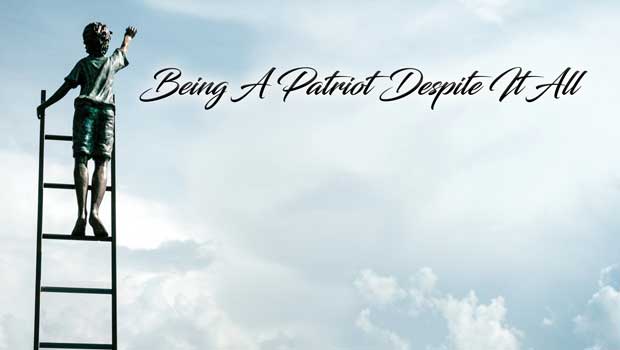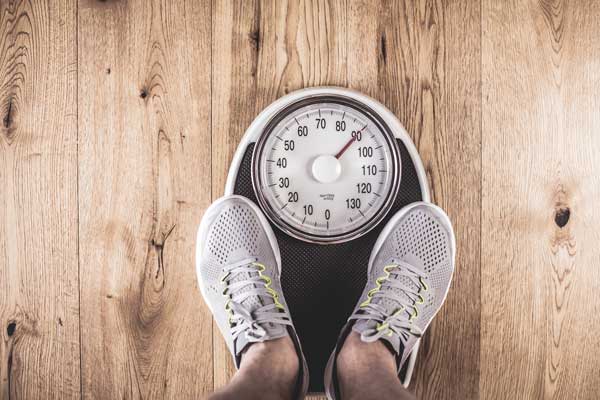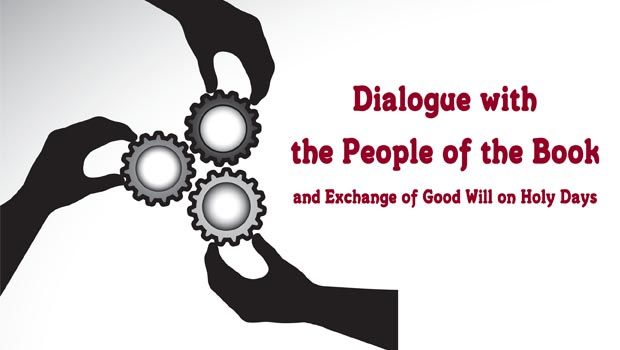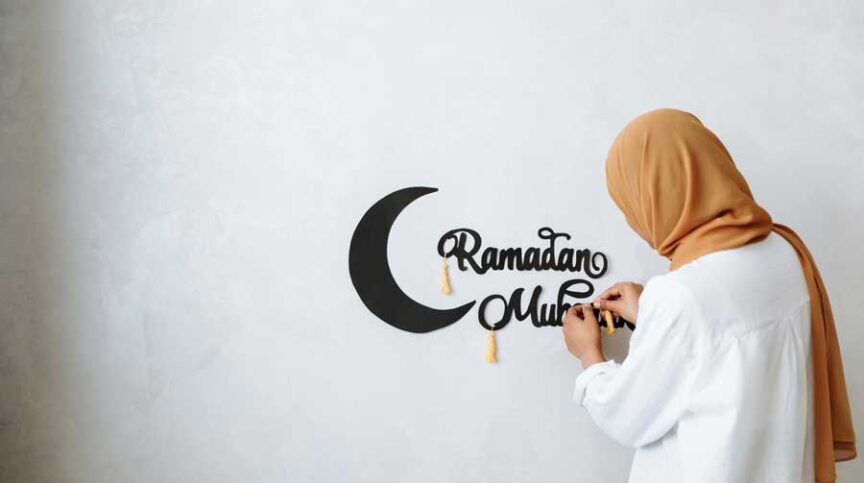Am I a patriot? Maybe I’m a fake. I believe in my country, but I’m not happy with things at present. The air in this country lately has felt more hostile. Many people are distressed, and my heart is constrained. But Allah has provided for all of that. We must do what we are able. When the question about whether I am a patriot was put to me, I had to go to the beginning of my journey. I am a military veteran, disabled at 100 percent. I am Muslim. I am female. What an unusual combination it is, indeed. I joined the United States Air Force in 1997. Was it an act of patriotism? Not necessarily. I believed what all the recruiting PR said about money for education both during and after enlistment. At that time, my son was young. I needed to not just survive, but to thrive. I would do anything for my child.
I had been working for an aerospace company, going to school full-time, and raising my child alone. I was exhausted and had developed a pattern of being ill at least weekly. I had lost weight and become very frail. It is not easy to carry a full-time college load while working 40hours a week. Add a young child to that equation and something must give. That something was me.
My father had served in WWII. There were no males in my generation. Oddly, I felt a prickly sense of obligation to serve. It may have been partly my father’s lifelong silence about his service (which I now recognize as being part of severe PTSD), and/or the environment of the military/industrial world in which we lived. And Allah knows best.
I had scored so well on the military’s placement exam, that I was permitted to choose what job I wanted. After Basic Military Training, also known as Boot Camp, a few people get sent to technical training schools. I absolutely did not want to be a bomb navigations systems specialist. Programming bombs with the “best” way to kill people felt immoral. I chose to be a weather equipment technician. The tech school was the second longest training in the entire military. Weather school had an overall failure rate of 83 percent. Women, however, failed at 97 percent. It was only later that I truly discovered why. My instructor in one of the advanced sections ordered me to stay after class one afternoon. There was no one present but him and me which was very much against regulations. He informed me that he was “going to do everything possible” to make sure I washed out of the school. “We don’t want any women in this man’s Air Force,” he said. I kept silent, knowing that no one would believe me if I told anyone and that it only would be me who would be punished.
I finished the school and, perhaps for the first time, I didn’t so much care about perfection, only survival. The trend continued for the entirety of my enlistment. My first assignment after tech school was in North Dakota. I got teased badly about being sent to such a “dreadful” place, but I was delighted to be sent to a place that actually had weather. One of my poor classmates ended up in New Mexico, where much of the equipment is covered with plywood for half the year so that mirrors don’t catch fire, circuitry doesn’t melt, and no one has anything to do.
The Abuse Begins
The abuse from my compatriots, all young men, started as soon as more than one of them was gathered together. Snide comments, jokes, and nasty references to my mixed marriage were commonplace. I had a trainee assigned to me who was fresh out of tech school. His first day, he got annoyed with the instruction I was giving and snatched a tool from my hand. I admonished him that what he was doing was endangering both of us. He didn’t care. Soon, both the weather and the NavAids sides of the house joined together in harassing and abusing me. “Coincidences” became common. Whoever was assigned to carry the pager that summoned us to Base Operations during any equipment emergencies happening off hours suddenly had some weak reason to leave the pager with me.
All work, all parts, all movements had to be documented. Parts that were used had to be re-ordered so that we had the required level in stock. Yet, I was reprimanded for writing too much documentation. I was reprimanded for coming in late when I had been on the base until 4:00 am. Regulation provided for me to have sufficient sleep. To report at 0700 would have been dangerous. The hostility both inside and in the field heightened. At one point, the same young man who had snatched the tool from my hand fought with me in the Weather Station, within hearing range of officers and pilots. He called me a N***** Lover. My husband came to pick me up from work the next day and asked the airman to walk outside with him. Apparently my tall, muscular husband, who outranked the airman, scared the stuffing out of the young man. His harassment of me eased just a little bit, but didn’t stop. I had a semi-vacation from the men in my shop harassing me when I went to Non-Commissioned Officer’s Instructional Classes. As far as I know, I still hold the highest overall score achieved. That, however, made me even more of a target. The abuse continued.
After three years at that station, the Gulf War began. I wasn’t worried about my assignment because Weather Equipment personnel are Mission Critical. I suspect that our one year of training makes us an expensive asset to replace. I was quite surprised one day when I was formally summoned to my commander’s office. The Colonel began our conversation with, “If you ever tell anyone about this conversation, I will deny it.” I was terrified. He smiled at me and told me that he was aware of my civilian job. He considered it far more mission critical than my military job and was going to release me to the company from which I was on military leave. For that, I will be forever grateful. I continued to work for a month or so, then remained on base for a few weeks until my husband was discharged. After that, we took our family and drove across country. I returned to work. We arrived just in time for me to get a new security clearance in time to be a Mission Controller for the payload of Space Shuttle Mission STS-44. What an amazing honor. Finally, I could do all that I was able, to preserve lives rather than risk ever being reclassified and having to take lives.
Working in the Aerospace Industry
My civilian field was called space surveillance. We need eyes to see who is doing what in the world. It is a tragedy of our times, but necessary for us to watch the world to detect hostile actions. I did well during the 30 days that we tested our product. The Air Force had cleaned me up, matured me, and made me more able to survive in the semi-military atmosphere of aerospace. I continued, for several years to work in Algorithm Simulation and Development, Phenomenology, and associated areas where I seemed to be the only person without a Ph.D. in mathematics or computer science. I added my Military Electronics training and finished degrees in biology and management science. When I finally finished my degree in Management Science, the company gave me a fifteen percent pay increase, not the promised fifty percent.
This happened just in time for the great aerospace crash of the late 1990s. I resigned to start my own company. About two years later, I applied to the same aerospace company where I’d worked for nearly 15 years. They would not hire me, and I learned why, off the record. A particular individual with a Ph.D. in mathematics flatly refused to work with me. It was because now I had chosen to wear both jilbaab and niqaab. I was only told that the doctor thought I was ill-behaved and had a poor work ethic. No one believed that. But his seniority won out. I could have bartered with the company and agreed to work without hijab. But I wish to please Allah SWT, far, far more than I will ever wish to please a group of humans, alhamdulillah.
Teaching — My Life Takes an Amazing Turn
Some months later, I performed jury duty with a woman who was a teacher for the California Youth Authority, a system that provides imprisonment for children and young people, aged up to 25. The woman suggested that I might make a good teacher. With three degrees in hard science, I scoffed? Her suggestion stayed in my mind though. I sat for the C-BEST (California Basic Educational Skills Test, the teachers’ qualification exam). Suddenly, I had a California teaching credential. What an amazing turn my life had taken. Only Allah can place people, ideas, words, and pathways in front of us and allow us the choice of whether to take what is offered.
I taught in poor areas where most of my students were minorities. It seemed that every child had been touched by hunger, gang violence, immigration issues, and similar challenges. One day, I got a call from Central Juvenile Hall in downtown Los Angeles. I was a substitute, so I had long since known that one never turns down a job. I reported to a tiny office with so many people in it that I couldn’t keep track. I flattened myself against the wall in front of the office manager while she barked questions at me. “How tough are you? Have you ever worked with the High-Risk Offenders (HROs)?” Then she decided without my having said a word. “Yeah, you look tough enough. Take room three.”
I was welcomed by the school and became quite well-tolerated, if not actually liked by the minors. I was never harassed because of my dress. One of the other teachers allowed me to use his classroom during lunch breaks in which to pray. Sadly, I was once again becoming extremely frail and missing at least a day a week due to illness. Finally, my doctors at the VA (Department of Veterans’ Affairs) told me that I could no longer work. I was simply too sick with PTSD, and lung and bone diseases to continue. I bargained with them. Maybe I could work just two days a week? Their response was, “No, you can never work again.” Now I stay home as my health gets better and worse. I ride the waves of fortune as they come. Alhamdulillah ‘ala kulli haaal (Praise be to Allah in every situation.)
Being A Patriot Despite It All
Since 9/11, my life has changed. In one incident, a woman standing in line two customers from where I was standing took out her phone and called 911 to report me. I was just standing, holding my purse. She assumed that I was there to do something bad and, within two minutes, I had a shotgun pointed at my face. Still, after this incident, I didn’t give up wearing my hijab. Why should I? Her fear should not cause me to disobey Allah’s command.
Before the recent presidential election, I made inquiries about migrating to three different countries so that, if the worst should happen, I might flee. But, I chose to live here, the land of my birth, as a Muslim. I stay because I care about my country. Does my attempting to be an example of a good Muslim detract from me being a patriot? Allah alone knows. I realize that the old saying “You can take a man out of the Marines, but you can’t take the Marines out of the man” is true (alhamdulillah, by 2011 14,000 women were in the Marine Corps, and about 203,000 overall in the military). I will never be able to stop being military. Patriotism is so interwoven with the training and indoctrination, all necessary for us to learn to run into the fire; veterans can never escape it. During the election of 2016, I sewed uniform arm flags onto my chadoor to show people that even if I looked like “them” (the Muslims), I will forever be an integral part of “us” (patriotic Americans). I cannot tolerate hatred of immigrants and minorities. They are just as much a part of this country as were my own grandparents, as much as I am. I can never hear the National Anthem without crying. Its meaning and its symbolism are a mixed bag for me, but it’s just part of that who I am that it still brings tears to my eyes.
Being physically disabled means that I will likely live in pain for the rest of my life. Veterans joke about “Dying on the Installment Plan.” I know that I am. Having PTSD means that I will rarely be able to have friends, to leave my house or ever easily be able to endure crowds. But, I volunteered for the military. I never regret it. I am part of this nation and I owe something to the people of this land. I have lived in the Middle East and in Africa. I adore both places, but I will always come back here. The United States alone qualifies as home. It’s a wonderful place and I choose to live here as a patriot and help the country fulfill a vision of being a land that is just, fair, and equitable to all its citizens; as well as being upstanding and honorable, seeking peace in a genuine and cooperative way, in all international relations.






